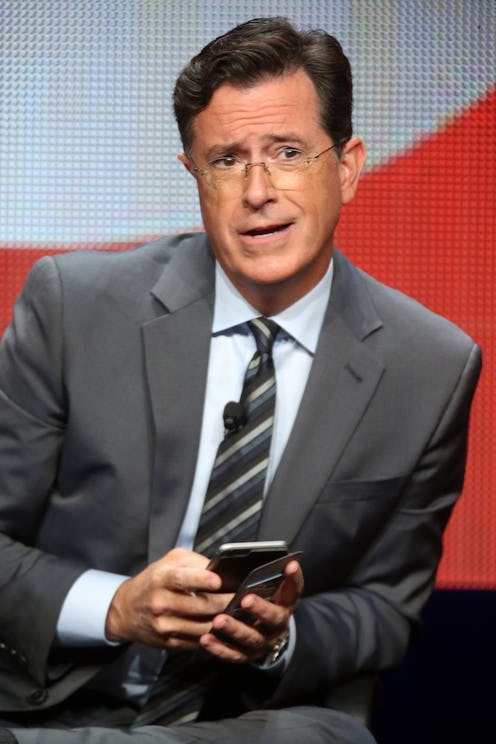News
This Colbert Anti-Vaxxer Rant Is Timeless
In case you haven't heard: No, there is absolutely no indication that vaccines cause autism. As if there weren't enough evidence, however, a new study published Monday that had tracked the effects of multiple vaccines that treat measles, mumps, and rubella, etc. found no indication of changes in brain activity or contribution to autism. This comes on the heels of the second GOP debate, when candidates were happy to bring up the age-old fallacy of vaccines and autism. Donald Trump called autism an "epidemic," and then proceeded to tell a story that was supposed to support his very unscientific claim that vaccines were responsible. While Ben Carson and Rand Paul — both doctors — said they were in support of vaccination, they underplayed its importance. In light of this renewed call to abandon modern medicine, I'm bringing back the famous Stephen Colbert vaccination debunking segment.
Though it aired more than a year ago, the bit remains unfortunately relevant. For instance, no one challenged Trump's allegations or credibility on the matter during the debate. "Just the other day, two years old, 2 and a half years old, a child, a beautiful child went to have the vaccine," he said. "And a week later [she] got a tremendous fever, got very, very sick, now is autistic." If only Colbert had been there.
In the video, Colbert addresses a resurgence of old-school diseases: measles, whooping cough, mumps. "Yes, these diseases are making a comeback, like Aerosmith in the 1990s," the host said. "Which also resulted in the spread to some disease."
"And folks, these are all diseases we have vaccines for. I mean, who knows why these vaccines are no longer effective?" he continued in his signature satirical manner. "Have the pathogens evolved? Are the doses too small? Why, science?" Cue some laughter. The video then cuts to a TV reporter explaining that more and more parents are choosing not to get their kids vaccinated. "OK, that would do it," Colbert quips. He then goes on to explain how the anti-vax movement emerged.
In the '90s, doctors began giving infants more vaccines, including some that contained a preservative called Thimerisal, which has mercury in it. "Mercury is bad for your brain," he reminded us. Coinciding with this practice was the drastic increase of autism cases in the U.S., leading parents and some celebrities to speak out in their fear that vaccines were causing autism. "It's the same way that the iPhone was introduced and World War II vets start dying," Colbert jokes, using an ironic analogy that rests the case.
The April 2014 episode went on to feature an interview with Dr. Paul Offit, a pediatrician whose expertise is vaccines. If a parent is not getting a vaccine for their child, Offit explained to Colbert, "then what they're doing is just putting aside an enormous amount ... of scientific evidence. There are more than 20 studies that show vaccines don't cause autism."
And yet, as Colbert cited, 29 percent of Americans still believe that vaccines are bad. While it certainly shouldn't be the hottest talking point of the 2016 election, as we know that vaccines are good and safe and don't cause autism, the truth about vaccines seems to have eluded the consciousness of many Americans — including certain GOP candidates.
